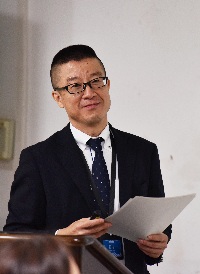News
菅豊教授が中国民俗学会・中山大学非物質文化遺産研究中心・中文系主催国際シンポジウム『非物質文化遺産保護倫理問題国際検討会』(広州・中山大学)で招待講演
2017年12月9〜11日に中国・広州市の中山大学で開催された中国民俗学会・中山大学非物質文化遺産研究中心・中文系主催国際シンポジウム『非物質文化遺産保護倫理問題国際検討会(International Seminar on Ethics and Intangible Cultural Heritage)』において、菅豊教授による「拒絶UNESCO ICH?——普遍性価値和地域性価値的相互矛盾」と題する講演が行われました。
※本講演はJSPS科研基盤B「パブリック・ヒストリー構築のための歴史実践に関する基礎的研究」の研究成果である。
当日の様子
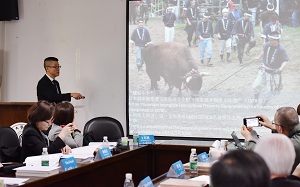 | 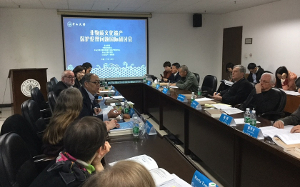 |
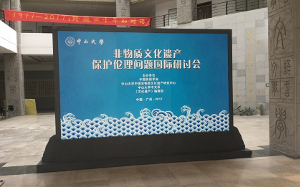 | 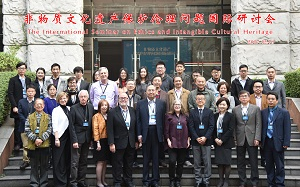 |
講演内容
【中文版】拒绝UNESCO ICH?——普遍性价值和地域性价值的相互矛盾
菅 丰(东京大学东洋文化研究所)
联合国教科文组织(UNESCO)所提出的非物质文化遗产(ICH)这一概念及其制度,它们始创于21世纪初的政治全球化浪潮之中,时至今日,已经在世界范围内对各个国家、地区的文化政策产生了极大的影响。世界各地的政府、专家、企业及承载地域文化的社区、群体、个人相互协作,赋予了多种多样的地域文化以ICH的意义和新的价值,并对它们进行保护及有效利用。ICH的制度、政策以及与之相关的各种活动本就属于对文化及社会的一种介入,那么,不论其初衷如何,必然也会对这些文化及社会产生影响。围绕ICH开展的各种活动,一方面能够增强ICH及当地社会的活力,另一方面也可能在当地社会引发伦理方面的各种负面问题。为解决或减轻这样的副作用,UNESCO的政府间委员会于2015年制定了《保护非物质文化遗产伦理原则》。
该伦理原则对施行非物质文化遗产保护条约的运营方针、以及国内立法框架进行了补充,对今后各国的ICH保护活动能够进一步健全发展有所贡献。同时我们也可期待该伦理原则能帮助解决在世界各国围绕ICH出现的伦理问题。但是,也存在一些依靠该伦理原则仍难以解决的问题,其中之一便是文化相对主义和普遍性人道主义相互矛盾的问题。
众所周知,文化相对主义和普遍性人道主义的相互矛盾是人类学史上长年争论的经典课题。文化相对主义尊重文化及其内在价值观的多元性,承认文化的多样性,人类学者及民俗学者以此为纲,否定狭隘且排他性的文化中心主义。但有时,在优先注重人权等人类共同的绝对利益及价值的普遍性人道主义面前,这种文化相对主义也会受到批判。在世界各地的多样性文化之中,存在着诸如女性割礼、儿童割礼以及奴隶制度等等不为现代价值观及人道主义所接受的文化现象。文化相对主义承认个别文化的价值及维持这种文化的权利,这种思想本身和普遍性人道主义之间并无矛盾;但在文化相对主义之下被相对化的个别具体文化现象之中,却存在着许多与普遍性人道主义相抵触的事例。
即便围绕着ICH保护这一点,这两种主义的相互矛盾有时也会产生问题。作为ICH对象的多样性文化有其地方性及个别性,这种文化多样性当然也是在UNESCO的伦理原则下得到尊重的。例如,保护非物质文化遗产伦理原则的第11条叙述如下:
11) Cultural diversity and the identities of communities, groups and individuals should be fully respected.
如此,UNESCO通过伦理原则表明了文化相对主义的价值,但同时也在此表明了如下植根于普遍性人道主义的价值和规范。伦理原则第11条继续叙述如下:In the respect of values recognized by communities, groups and individuals and sensitivity to cultural norms, specific attention to gender equality, youth involvement and respect for ethnic identities should be included in the design and implementation of safeguarding measures.
UNESCO是为了促进国际和平和人类共同福祉而设立的机构,在其创办思想的根基之中就横亘着普遍性人道主义。理所当然,由其所创设的制度也受到了基于普遍性价值与规范的伦理的很大影响。
伦理本就内嵌在文化和社会之中,其自身便构成文化的一部分。因此,如果从尊重文化多样性的立场而言,就不得不承认每种文化都有其伦理上的多样性。但是,承认这种伦理上的多样性,也就可能意味着同时承认基于文化相对主义的无规范性。一旦如此,那么极端而言,诸如女性割礼这样的文化也有可能被看成是ICH。UNESCO虽然承认文化的多样性,但为避免陷入这种无规范性,便提出了体现普遍性价值和规范的伦理原则。由此,它在主张尊重不同文化规范敏感性的同时,也明确了如性别平等之类在现代已无法动摇的普遍性规范。
总之,在UNESCO的ICH制度下,尽管每种文化的价值都得到尊重,但只有符合普遍性人道主义规范的文化才可能被认定为ICH,这成为了一种默认的前提条件。在判定某种文化能否通过UNESCO的ICH认定、并被记入“名录(Lists)”之时,这一前提条件就会凸显出其存在来。
例如,中国政府于2014年申报的“彝族火把节”这一项目未获通过,被判定需要向政府间委员会再次补充提交申报材料。“彝族火把节”中包括斗牛活动,而正是这一令动物格斗的行为被政府间委员会视作了问题所在。这项节日活动对彝族来说可以称得上是其民族认同感的源泉,却正是因逐渐席卷世界的“动物保护”这一现代普遍性规范而受到了否定。
在由UNESCO掌握决定权的世界级ICH评审阶段,不只是性别不平等的问题,诸如暴力——在节庆活动中的肆意狂欢,及使用或杀伤动物的行为——食用或活祭等等,像这些包含于传统文化之中的要项,如今都必须基于现代的、普遍性的规范来对它们进行评价。原本,我们应当做的,是在详细考察各种文化现象对社会及人群所具有影响力的基础之上,首先因地制宜地来分析这些文化的价值与伦理问题。然后,还应当进一步检验普遍性伦理与地域伦理的相容性。
但是,要在UNESCO对列入ICH名录进行审议时充分展开这样的探讨,却有相当的难度。这是因为,世界各国的人们有着不同的文化规范以及与之相关的敏感性,以某些特定人群的规范或敏感性来看,有一部分文化是无从被接受的。像这样无法达成价值统一的文化就会阻碍人类的共生。就是基于这种简单的逻辑,类似动物格斗文化这样有争议的地域文化,在UNESCO的ICH制度下就无法被采纳了。
在此,我们一方面认可UNESCO的ICH概念和制度有巨大的可能性,同时也必须承认这一制度有其不可避免的局限性。我们必须留意这样一种危险,即根据文化性质的不同,在UNESCO的ICH制度所寻求的规范之下某些地域文化反而有可能被否定,甚至可能损害保持这种文化的社区、群体、个人的尊严及他们的名誉。在政治全球化之中形成的UNESCO的ICH制度,由它所生成的价值观和伦理观,有时会使得一些传统的传承人的行为遭到否定。对此,与ICH制度相关的各种群体应该多加留意,在申报等活动中慎重对待。同时,与ICH制度相关的各种群体必须意识到,如果UNESCO的ICH制度所生成的价值观和伦理观可能对传承人的尊严造成损害,那么就应该事先放弃或拒绝将地域文化申报成为ICH的计划或事业。另外,与暗含普遍性价值的UNESCO的ICH制度不同,国家级、地方级的ICH制度更为尊重个别价值,像这样的制度则理应得到进一步充实完善。
本次发表以笔者亲自介入、直接参与的日本国家级重要无形民俗文化财“越后斗牛”为题材。从制度上而言,这一文化身处UNESCO的ICH名录候补之列,有可能会得到日本政府的提名申报。笔者以“文化中介”的身份,将现行UNESCO的ICH制度所含有效性与危险性的相关信息传达给地域社会,并与当地人们就对这一制度的接受与拒绝问题进行了共同探讨。通过本次发表,我对这一过程及结果进行说明。
【英文版】Rejecting UNESCO Intangible Cultural Heritage (ICH)? The conflict between universal values and local values
Yutaka Suga (The University of Tokyo)
The concept and scheme of UNESCO’s Intangible Cultural Heritage (ICH), which emerged at the start of the 21st century in the global political context, have since spread and are substantially impacting cultural policies in countries and regions throughout the world. As a result, governments, experts, businesses, communities and groups that are stewards of cultural heritage, and individuals around the world are collaborating to designate a great variety of regional cultural heritages as ICHs and to thereby assign new value to, safeguard, and utilize such cultural heritages. Because ICH schemes and policies and related activities are interventions into the culture and society, irrespective of their intent to do so or not, they influence the culture or society. Although the various impacts associated with ICH have, in some cases, contributed to the vitalization of communities with a recognized ICH, in other cases, they have caused a variety of ethical conflicts in the communities in question. In 2015, the UNESCO Intergovernmental Committee established Ethical Principles for Safeguarding Intangible Cultural Heritage (hereinafter “Ethical Principles”) to resolve or alleviate such adverse side effects.
The Ethical Principles, which constitute guidelines for implementing the Convention for the Safeguarding of the Intangible Cultural Heritage and are intended to complement national legal frameworks, are expected to further enhance efforts in each country to safeguard ICHs. In addition, the Ethical Principles are expected to contribute to the resolution of the various ethical conflicts associated with ICHs that are occurring around the world. That said, issues remain and continue to defy easy resolution even when these Ethical Principles are applied. One of these issues is the conflict between cultural relativism and universal humanism.
As is well known, the conflict between cultural relativism and universal humanism is a classic, long-running topic of debate in the field of anthropology. Anthropologists and folklorists have adopted cultural relativism, wherein the existence of diverse cultures is acknowledged and the pluralism of value systems inherent in each culture are respected, as their guiding principle. Accordingly, they have repudiated narrow-minded and exclusionary ethnocentrism. Conversely, cultural relativism has, at times, been criticized from the standpoint of universal humanism, which prioritizes human rights and other universal interests and absolute values that are common to all people. Among the many cultures that exists around the world, some comprise practices such as female genital mutilation, infant circumcision, and slavery that are considered unacceptable from the standpoint of modern values and humanism. Although cultural relativism’s underlying tenet, which is to acknowledge the values of individual cultures and the right to maintain such values, is not inconsistent with universal humanism, among the various individual cultures that are relativized by cultural relativism, there are numerous examples that conflict with universal humanism.
On occasion, the conflict between these two ideologies leads to conflicts regarding the safeguarding of ICHs. The diverse cultures that constitute ICHs have a locality and individualistic character. Naturally, the Ethical Principles set forth by UNESCO respect this cultural diversity. For example, Item 11 of the Ethical Principles regarding the safeguarding of ICHs, reads as follows:
11. Cultural diversity and the identities of communities, groups and individuals should be fully respected.
UNESCO thusly affirms the value of cultural relativism in the Ethical Principles. At the same time, however, it asserts the value and norms rooted in universal humanism. Item 11 of the Ethical Principles continues as follows:
In the respect of values recognized by communities, groups and individuals and sensitivity to cultural norms, specific attention to gender equality, youth involvement and respect for ethnic identities should be included in the design and implementation of safeguarding measures.
UNESCO was established as an organization whose goals include promotion of world peace and the wellbeing of all people. Underlying this founding principle is universal humanism. It is only natural that the schemes developed by UNESCO should be strongly influenced by ethics based on universal values and norms.
Normally, ethics are embedded in culture and society and constitute a part of the culture. Accordingly, respecting cultural diversity also means respecting the ethical diversity of each culture. However, acknowledging such ethical diversity may also lead to acknowledging anomy based on cultural relativism. If that were to happen, in extreme cases, cultural practices such as female genital mutilation could also be deemed ICHs. To avoid this embracing anomy, UNESCO, while recognizing cultural diversity, set forth Ethical Principles based on universal values and norms. In so doing, UNESCO calls for respect towards the cultural norms and sensitivity of individual cultures but also presents universal norms such as gender equality that cannot be questioned in the present day.
In other words, UNESCO’s ICH scheme contains an unwritten condition that, while the values embedded in each culture should be respected, for a culture to be deemed an ICH, it must comply with the norms of universal humanism. This condition is manifested in the deliberation regarding whether or not a given culture should be designated as an ICH and inscribed in the “Lists” by UNESCO.
For example, it was decided that the Chinese government’s nomination of the Torch Festival of the Yi People as an ICH in 2014 should be resubmitted to the Intergovernmental Committee. The Torch Festival includes bullfighting, and it was this treatment of animals that the Intergovernmental Committee found to be problematic. This festival, which could even be said to be the origin of the Yi’s ethnic identity, was treated negatively based on the present-day universal norm of “animal welfare,” which is sweeping across the globe.
In international process by which UNESCO recognizes ICHs, various elements embedded within traditional culture—which includes not only gender inequality but also violence, unruliness, the killing or wounding of animals, use of animals for food or sacrifices, etc.—are assessed based on present-day universal norms. Ideally, after a detailed investigation on the impact of a given cultural heritage on society and people has been conducted, the problematic values and ethics of the culture in question should be presented to and discussed by the group practicing the culture. It is only after this has been completed that the compatibility of a given community’s ethics with universal norms should be examined.
That said, it would be difficult to adequately discuss such issues in the context of deliberations on cultures to be inscribe on UNESCO’s ICH list. People around the world have diverse cultural norms and cultural sensitivities, and there are certain norms and sensitivities that cannot be accepted. Such cultural values that cannot be universally accepted inhibit humanity’s sense of unity. Based on such a simplistic reasoning, controversial local cultures, such as those that entail animal fighting, are not even considered in the UNESCO’s ICH scheme.
Given the above, while acknowledging the enormous potential of UNESCO’s ICH concept and scheme, we must recognize the scheme’s inevitable limitation. We must realize that a given local culture, depending on its specific characteristics, may be treated negatively based on the norms demanded by the ICH scheme; furthermore, in doing so, there is a risk that the dignity and reputation of the community, group, or individual practicing the culture will be damaged. The value system and ethical stance that have emerged from the ICH scheme in the global political context may, in some cases, result in rejection of behaviors and actions of tradition bearers. The various individuals involved with the ICH scheme should keep this point in mind and handle nominations with extreme care. Moreover, if there is a possibility that the value system and ethical stance that have emerged from the ICH scheme will harm the dignity of tradition bearers, plans and efforts to transform a local culture into an ICH should be abandoned or rejected before they are implemented. Furthermore, efforts should be made to enhance country- and regional-level ICH schemes that, unlike the universal values implicitly embedded in UNESCO’s ICH scheme, respect the values of individual cultures.
In this presentation, I deal with bullfighting, which is designated as an Important Intangible Folk-Cultural Property Designated by the Country of Japan, in which I am personally involved. There is a possibility that the Japanese government will submit a nomination for this culture to be inscribed in the UNESCO ICH list. As a cultural broker, I provided information regarding the validity and risks of the current ICH scheme to the local community and, together with community members, discussed whether to accept or reject the scheme. In my presentation, I will describe this process and results.
登録種別:研究活動記録
登録日時:FriDec1512:47:472017
登録者 :菅・川野・藤岡
掲載期間:20171209 - 20180309
当日期間:20171209 - 20171209

